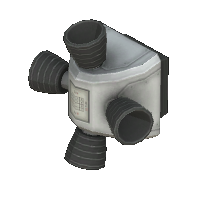Difference between revisions of "RV-105 RCS Thruster Block"
| Line 23: | Line 23: | ||
* Initial Release | * Initial Release | ||
| − | |||
| − | |||
| − | |||
{{Parts}} | {{Parts}} | ||
Revision as of 19:49, 15 July 2014
| RV-105 RCS Thruster Block | ||
| Reaction Control System by STEADLER Engineering Corps | ||
| Radial size | Radial mounted | |
| Cost | (total) | 45.00 |
| Mass | (total) | 0.040 t [1] |
| Drag | 0.1 [1] | |
| Max. Temp. | 1500 K | |
| Impact Tolerance | 15 m/s | |
| Research | | |
| Unlock cost | 1 200 | |
| Since version | 0.11 | |
| Part configuration | rcsBlockRV-105.cfg | |
| Maximum thrust | (1 atm) | 0.42 kN |
| (vacuum) | 1.00 kN | |
| Isp | (1 atm) | 100 s |
| (vacuum) | 240 s | |
| Fuel consumption | 0.11 | |
| Thrust vectoring | No | |
| Packed volume | 40 l | |
| ||
The RV-105 RCS Thruster Block is a part with four RCS thrusters used for spaceship rotation and translation movement and is fuelled by monopropellant.
Usage
This RCS thruster can produce a force in any of the directions its nozzles are pointing. Four of these blocks equally spaced around the body of a vessel is typically enough to allow a small craft to rotate and translate in any direction, but larger ships often require more. In the current paid version (but not the 0.18.3 demo), it has "PhysicsSignificance = 1", making it a zero drag and massless part.
Description
| “ | The recent discovery of a third law of physics made it possible for STEADLER Corps engineers to produce these small monopropellant thrusters, to help with attitude control and linear motion. Even though many Kerbal physicists still dispute the validity of this new law, studies show that the thrusters seem to work as advertised. — STEADLER Engineering Corps |
” |
The third law of physics referenced in the quote is likely a reference to third law of motion, which says that every force generates an equal counter-force. That's exactly how monopropellant thrusters or rather any kind of reaction engines work: When expelling propellant with a specific force, an equal force pushes the spacecraft in the opposite direction.
Changes
- "PhysicsSignificance = 1" added. The part now has 0 mass and drag, despite the listed values.
- Nominal performance increased, bug providing vastly superior linear performance removed.
- Retextured, given Isp values and actual mass.
- Initial Release
